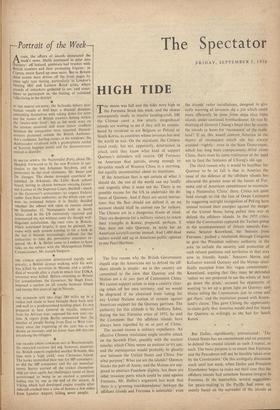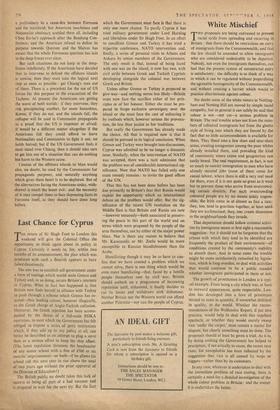HIGH TIDE
THE moon was full and the tides were high in the Formosa Strait this week, and the shores consequently ready to receive landing-craft. Off the Chinese coast a few utterly insignificant islands are waiting to see if they will be remem- bered by mankind as are Belgium or Poland or South Korea, as countries whose invasion has sent the world to war. On the mainland, the Chinese stand ready, but not, apparently, determined to attack until they know what kind of support Quemoy's defenders will receive. Off Formosa an American fleet patrols, strong enough to devastate much of Western China in a morning, but equally uncommitted about its intentions.
If the American fleet is not certain of what it should do, the rest of the world can say loudly and urgently what it must not do. There is no possible excuse for the US to undertake the de- fence of Quemoy. And if there are secret instruc- tions that the fleet should not defend it, on no account should bluff be carried too far inshore. The Chinese are in a dangerous frame of mind. They are desperate for a military victory to renew their triumphs in Korea; prepared, perhaps, if they dare not take Quemoy, to settle for an American aircraft-carrier instead. And 1,400 dead sailors would add up in Americampublic opinion to one Pearl Harbour.
The first reason why the British GOvernment should urge the Americans not to defend the off- shore islands is simple: we in this country are committed to the view that Quemoy and the Matsus are a de jute part of Communist China. We cannot support action to stop a country clear- ing rebels off her own territory; and we would be disgraced if we abstained from voting for any United Nations motion of censure against American support for the Quemoy garrison. The authority for this attitude is Sir Anthony Eden; during the last Formosa crisis of 1955, he told the Commons that `the offshore islands have always been regarded by us as part of China.'
The second reason is military expediency. An effective Chinese retaliation might involve attack on the Seventh Fleet, possibly with the nuclear missiles which China seems so anxious to try put, and the consequence would probably be ghastly war between the United States and China. For what purpose? What use are the islands? Quemoy blocks the port of Amoy, and the Matsus are sup- posed to obstruct Foochow slightly, but there are other invasion ports which could be used against Formosa. Mr. Dulles's argument last week that there is a `growing interdependence' between the offshore islands and Formosa is untenable : even the islands' radar installations, designed to give early warning of invasion, do a job which could more efficiently be done from ships than from islands under continual bombardment. Or was he thinking of General Chiang's boast that he retains the islands as bases for 'reconquest'.of the .main-, land? If so, this would commit America to the theory of reconquest which she has always avoided—rightly : even in the State Department, which has long been conspicuously -blind about China, there must be some realisation of the need not to feed the fantasies of Chiang's old age.
The third reason why it would be healthier for Quemoy to be let fall is that in America the issue of the defence of the offshore islands has obscured the greater issue of the future of For-, mosa and of American commitment to maintain- ing a Nationalist 'China' there. Critics not quite bold enough to risk the fate of Owen Lattimore by suggesting outright recognition of Peking have instead trained their energies against the danger of the United States being pulled into war to defend the offshore islands. In the 1955 crisis, when the Communists captured the Tachen group to the accompaniment of threats towards For- mosa, Senator Knowland, the 'Senator. from Formosa,' pushed a resolution through Congress to give the President military authority in the area 'to include the security and protection of such related positions and territories in that area now in friendly hands.' Senators Morse and Kefauver wanted Quemoy and the Matsus speci- fically excepted from this vague commitment: Knowland, arguing that they must be defended `unless we are prepared to see the whole of Asia go down the drain,' accused his opponents of wanting 'to set up a green light on Quemoy and Matsu telling the Communists just to come and get them,' and the resolution passed with Know- land's clause. This gave Chiang the opportunity to claim gaily that America would shed her blood for Quemoy as willingly as she had for South Korea.
But Dulles, signifi6antly, prevaricated : 'The United States has no commitment and no purpose to defend the coastal islands as such. I repeat, as such. The basic purpose is to assure that Formosa and the Pescadores will not be forcibly taken over by the Communists.' On this ambiguity discussion stuck until last week, when Dulles and President Eisenhower began to make out their case that the offshore islands had somehow become integral to Formosa. In the meanwhile, several suggestions for peace-making in ffie Pacific had come up, mostly based on the surrender of the islands as a preliminary to a cease-fire between Formosa and the mainland; but American touchiness and Nationalist obstinacy scuttled them all, including Chou En-lai's approach after the Bandung Con- ference; and the American refusal to define its purpose towards Quemoy and the Matsus has meant that the whole Formosan question has lain in the deep-freeze ever since.
But such situations do not keep in the deep- freeze indefinitely. If the Americans have decided that to intervene to defend the offshore islands is unwise, then they must take the logical next step as soon as possible : get Chiang's men out of them. There is a precedent for the use of US forces for this purpose in the evacuation of the Tachens. At present the Americans are getting the worst of both worlds : if they intervene, they risk precipitating another, far more hazardous, Korea; if they do not, and the islands fall, the collapse will be used in Communist propaganda as a proof that the US is impotent or afraid. It would be a different matter altogether if the Americans felt they could afford to leave Nationalists and Communists to fight it out, no holds barred; but if the US Government feels it must stand over. Chiang, then it should take care to get him out of a situation that can do nothing but harm to the Western cause.
Cession of the offshore islands to Mao would also, no doubt, be used by the Communists for propaganda purposes, and naturally anything which gives them heart is to be deplored. But of the alternatives facing the Americans today, with- drawal is much the lesser evil : and the necessity of it may compel them to face depressing facts in Formosa itself, as they should have done long before.



































 Previous page
Previous page